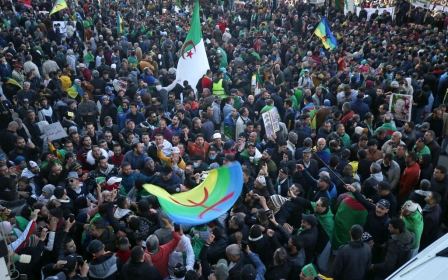Algeria: Bill to revoke citizenship met with anger and fear among activists
A new bill being considered by the Algerian government, which could see people have their citizenship revoked if they are considered detrimental to the state, has been decried online by activists and social media users.
The draft law was submitted to the Algerian cabinet by Justice Minister Belkacem Zeghmati in the form of an amendment to the nationality law.
According to government spokesperson Ammar Belhimir, the withdrawal of someone’s citizenship would occur in three circumstances: if someone is involved in acts that seriously harm the interests of the state, or undermine national unity; if someone takes part in activities abroad that are deemed an act of terrorism, or they are part of an organisation that propagates or finances terrorism; and if someone deals with a country or countries that are hostile to the Algerian state.
The bill needs to be approved by the council and ministers and ratified by the parliament to be made into law.
According to local media, the bill is aimed at dissidents abroad, particularly those who have a large social media following and attempt to disparage the government. Algerian President Abdelmadjid Tebboune previously told Algerian media that many of the social media accounts used by Algerians residing abroad try to "create confusion in the country".
New MEE newsletter: Jerusalem Dispatch
Sign up to get the latest insights and analysis on Israel-Palestine, alongside Turkey Unpacked and other MEE newsletters
Online, many have denounced the amendment to the law as a way to target Hirak activists who have been demanding change and an end to government corruption.
Translation: Withdrawing someone’s citizenship is a catastrophe and you will not see the light of day. It is impossible to implement and contradicts human rights conventions which state that everyone has the right to citizenship. The signatories of the conventions do not allow people to be without citizenship. But if they take your Algerian citizenship and give you another, a European one for example, then long live Tebboune.
Translation: I am not preempting events, however I predict that the decision to withdraw the Algerian citizenship... will be the straw that breaks the camel’s back.
Many took to social media to express the belief that if the law is passed, it would soon become a tool for the government and authorities to silence dissenting voices. Some have also claimed that the conditions outlined are vague and subjective.
Translation: After withdrawing nationality, can you withdraw the Algerian blood from our veins?
Translation: Algerian authorities are following in the footsteps of Bashar al-Assad and Abdel Fattah el-Sisi, revoking anyone’s citizenship the moment they smell criticism of authorities or mention their dissatisfaction of the situation in the country…
According to Belhimir, the withdrawal of someone’s citizenship would be in line with what international conventions allow, and will take place only after appeal procedures have been heard.
The hashtag #StopTortureInAlgeria was trending in Algeria on Thursday, and used by people to highlight human rights abuses in the country – some called for investigations into human rights abuses, and light to be shed on the plight of activists who have been abused by the authorities.
Some of the testimonies shared with the hashtag included examples of torture, such as electric shocks, beatings, and the denial of access to medical help.
According to a report by Human Rights Watch, Algerian authorities have continued repressing the Hirak anti-government protest movement. Hundreds of Hirak protesters were arrested during demonstrations that swept across the country in early 2020. Many of those were sentenced on charges of "illegal gathering", "harming national unity" or "demoralising the army".
Middle East Eye delivers independent and unrivalled coverage and analysis of the Middle East, North Africa and beyond. To learn more about republishing this content and the associated fees, please fill out this form. More about MEE can be found here.




